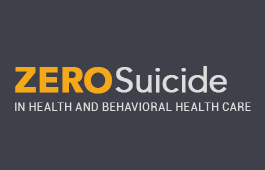Zero Suicide

Zero Suicide is a commitment to suicide prevention in health and behavioral health care systems and is also a specific set of strategies and tools. The foundational belief of Zero Suicide is that suicide deaths for individuals under care within health and behavioral health systems are preventable.
Zero Suicide presents both a bold goal and an aspirational challenge. Organizations that have used this approach found a 60-80% reduction in suicide rates among those in care.
The foundational belief of Zero Suicide is that suicide deaths in health care systems are preventable.
Who Can Adopt Zero Suicide?
The Zero Suicide approach can be adopted by any health care system working with individuals where risk for suicide can be detected, monitored, and treated, including:
- Behavioral health organizations
- Primary care and integrated delivery systems
- Emergency departments and hospitals
- Physicians who treat factors related to increased suicide risk such as chronic pain and sleep disorders
- Juvenile justice settings
- Senior living facilities
- Veteran-serving health care organizations
The Zero Suicide Toolkit is a collection of information, tools, resources, and activities for health and behavioral health care leaders and leadership teams to assist them in implementing the seven elements of Zero Suicide. Training and consultation in the Zero Suicide approach is available by contacting us at [email protected].
SPRC’s Role
SPRC provides support for the Zero Suicide initiative by:
- Contributing to the Zero Suicide website and online Zero Suicide Toolkit
- Providing technical assistance to states, grantees, tribes, and others on how to adopt the Zero Suicide model
- Delivering webinars for general audiences on elements of the Zero Suicide approach
- Supporting health care systems and providers by articulating best practices for suicide care
